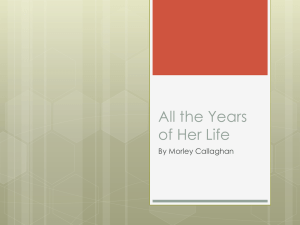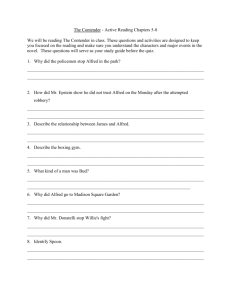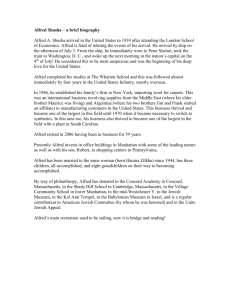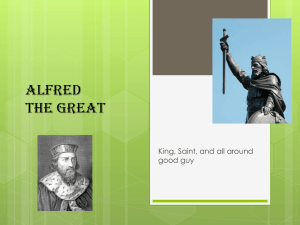10-1 Final exam questions Glenmary Jan 14
advertisement
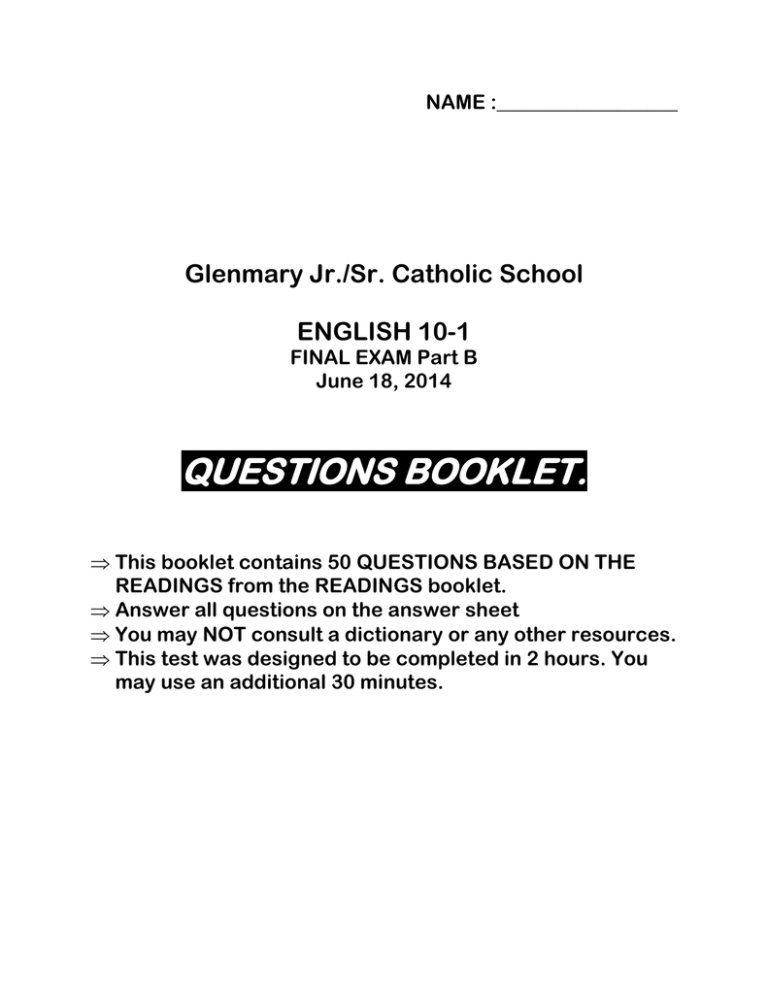
NAME :__________________ Glenmary Jr./Sr. Catholic School ENGLISH 10-1 FINAL EXAM Part B June 18, 2014 QUESTIONS BOOKLET. This booklet contains 50 QUESTIONS BASED ON THE READINGS from the READINGS booklet. Answer all questions on the answer sheet You may NOT consult a dictionary or any other resources. This test was designed to be completed in 2 hours. You may use an additional 30 minutes. Questions 1 – 15 are based on Text 1 Fish Cheeks by Amy Tan 1. In Fish Cheeks, why is the author worried about having guests over for Christmas dinner? A. Because they do not like Chinese food B. Because they will be bored C. Because her father will burp D. Because they will be disappointed E. None of the above 2. How does she treat Robert when he arrives? A. She is happy to see him B. She acts as if she does not care about him C. She speaks very rudely to him D. She goes to her room and stays there unit dinner is served E. None of the above 3. What does her father do to embarrass her? A. He gives her fish cheeks B. He burps C. He grunts while eating D. He gives her fish cheeks and burps E. He grunts and burps 4. What does her mother say after the meal? A. She apologizes for her father B. She punishes the author for being rude C. She tells her to be proud of being different D. She says that she thinks the guests were rude E. None of the above 5. What does the author realize many years later after the meal? A. She realizes her mother made all her favourite dishes B. She realizes that she was rude C. She realizes she was right to ignore Robert D. She realizes she was ashamed of her family E. None of the above 6. For whom does Robert’s father work? A. A store B. A school C. A church D. A government 7. Which of the following is not included in the meal? A. Squid B. Tofu C. Cod D. shellfish E. Fungus 8. What does Amy’s father offer her? A. Tofu B. Shellfish C. A fish eye D. A fish cheek E. Fungus 9. What is accepted as a polite Chinese custom? A. Belching B. Licking the plate C. Grunting while eating D. Talking with your mouth full 10. Who bought the author a tweed miniskirt? A. Her father B. Her mother C. Robert D. Robert’s father 11. What does wedge mean? A. Shock B. A triangular slice C. Gather D. Colour E. A loud noise 12. What does muster mean? A. Shock B. A triangular slice C. Gather D. yellow E. wrinkle 13. What does clamour mean? A. Shock B. A triangular slice C. Gather D. Colour E. A loud noise 14. What does appall mean? A. Shock B. A triangular slice C. Gather D. Colour E. A loud noise 15. What does rumple mean? A. Shock B. soft C. Gather D. wrinkle E. A loud noise Question 16 is based on text 2 Polonius’ speech to Laertes Hamlet - Act 1, scene iii /22 16. Paraphrase the corresponding lines, as indicated in bold, from the speech (2 marks each) 1. ___________________________________________________________________________ ___________________________________________________________________________ 2. ___________________________________________________________________________ ___________________________________________________________________________ 3. ___________________________________________________________________________ ___________________________________________________________________________ 4. ___________________________________________________________________________ ___________________________________________________________________________ 5. ___________________________________________________________________________ ___________________________________________________________________________ 6. ___________________________________________________________________________ ___________________________________________________________________________ 7. ___________________________________________________________________________ ___________________________________________________________________________ 8. ___________________________________________________________________________ ___________________________________________________________________________ 9. ___________________________________________________________________________ ___________________________________________________________________________ 10. ___________________________________________________________________________ ___________________________________________________________________________ 11. ___________________________________________________________________________ ___________________________________________________________________________ Questions 17 - 22 are based on Text 3 How to Live to Be 200 by Stephen Leacock 17. The words “Health Habit” are capitalized to A. Draw emphasis to the importance of staying healthy B. Create a sarcastic tone C. Suggest that Jiggins was an important man D. Emphasize the alliteration 18. “he got so he could open and close his pores at will” is an example of A. Situational irony B. Dramatic irony C. Hyperbole D. Satire 19. Explain why the author chose to put Jiggins’ actions in paragraph3 in that particular order. ______________________________________________________________________ ______________________________________________________________________ ______________________________________________________________________ ________________________ /2 20. The author uses varied lengths of sentencing. What is the intended effect of the short sentences such as “He liked it” and “Jiggins is dead”? ______________________________________________________________________ ______________________________________________________________________ ______________________________________________________________________ ________________________ /2 21. The repetition of the word “they” in paragraphs 6-8 is deliberate. What do you think is the intended effect? ______________________________________________________________________ ______________________________________________________________________ ______________________________________________________________________ ________________________ /4 22. The most likely synonym for “reminiscences” is: A. Long stories B. Incoherent ramblings C. Nostalgic memories D. complaints Questions 23 - 28 are based on Text 4 The Factory Hour by Tom Wayman 23. In lines 1 to 7, the poet establishes a sense of the workers’ being A. hurriedly gathered by an urgent need B. steadily drawn by a powerful force C. preoccupied with their thoughts D. concerned about their families 24. In lines 13 to 19, the portrayal of the atmosphere within the factory is most strongly enhanced by the poet’s use of A. imagery B. hyperbole C. foreshadowing D. personification 25. In context, the phrases “first rivets shot home” (line 22) and “the whir/of the hood line’s drills” (lines 23 to 24) evoke a sense of A. enduring strength B. rising momentum C. restrained movement D. intense concentration 26. In the poem, the “hooter” (lines 20, 39, and 45) serves to A. provide a goal for the workers B. signal a change in daily activity C. ensure the safety of the workers D. indicate the completion of a particular task 27. In which of the following quotations does the poet use alliteration to reinforce the busy atmosphere of the factory? A. “ Noise of the suction vacuum, the cutter, the roar / of dollies trundled in for a finished hood” (lines 27–28) B. “ Lunch at sea: sprawled by the hoods in ordinary weather / or outside at the doors to the parts-yard if fine” (lines 36–37) C. “ and the constant shuttling of the forklifts / show that the ship still steams” (lines 38–39) D. “ under the whir of the half-ton crane, rattle of the impact wrench, / grating of new hood shells” (lines 43–44) 28. In this poem, the speaker equates the experience of working in the factory with A. being on a voyage B. travelling back in time C. exploring the unknown D. navigating through traffic Questions 29 - 36 are based on Text 5 Crossing the Bar by Alfred Lord Tennyson 29. The theme of this poem is best described as the A. Inevitable B. Silence of eternity C. Approach of death D. Acceptance of death 30. The phrase “moaning of the bar” is best explained as A. Weeping B. Suffering C. Ship-board noises D. The rush of the tide over gravel 31. In line 15, “my pilot” most likely refers to A. God B. Eternity C. The ship’s guide D. Someone who can show the way 32. Which of the following quotations most clearly expresses the poet’s attitude? A. “twilight and evening bell, and after that the dark! (lines 9-10) B. “when that which drew from the out the boundless deep/turns again home” (lines 7-8) C. “but such a tide as moving seems asleep” (line 5) D. “and may there be no moaning of the bar,/When I put out to sea” (lines 3-4) 33. The imagery of this poem is mostly of A. The city B. The bar C. The sea D. Victory 34. In lines 12-14, three words other than the first word of the each line are capitalized because: A. Of poetic licence B. Proper nouns are always capitalized C. Of the importance in the poet’s thought D. In Tennyson’s day, English had different rules for capitalization 35. In the quotation “When that which drew from boundless deep” (line 7), the pronoun “that” does not have a clear antecedent: It might not even refer to anything mentioned before. The antecedent of the pronoun “that” is the... A.“I” who is embarking on the journey B. Soul leaving the boundary of time and space C. Tide that moves to and from the “boundless deep” D. “Pilot” who guides the ship once it has left the harbour 36. The tone of this poem is best described as A. Calm B. Anxious C. Grieving D. hopeless Questions 37 - 50 are based on Text 6 All the Years of Her Life by Morley Callaghan 37. Alfred Higgins has been working for Sam Carr: A. since he left school B. for six months C. for a few weeks D. as a favour to Alfred’s father 38. When he is first approached by his employer, Alfred: A. denies the accusation B. hides the stoeln items on a back shelf C. Immediately returns the stolen items D. Calls Mr. Carr a liar 39. Alfred is guitly of A. robbery B. larceny C. petty theft D. nothing 40. From evidence in the story, we know that Alfred: A. is bored with his job B. enjoys getting into trouble C. has trouble keeping a job D. is friendly with his mother 41. From Mr. Carr’s actions, we can conclude that A. He is eager to see Alfred locked up B. He wants to let Alfred keep his job C. he is hesitant to call the police D. he likes Alfred’s mother 42. Alfred expects his mother to A. rush in to the drugstore in a rage B. Urge Mr. Carr to call the police C. Beg Mr. Carr to give her son anthoer chance D. defend him and deny the theft 43. Mrs. Higgins surprises both Alfred and Mr. Carr by A. Her calm manner B. her stern looks C. the way she is dressed D. she does not surprise them 44. Alfred’s reaction to the incident is A. anger at Mr. Carr B. admiration at his mother’s strength C. shame and guilt D. relief 45. At the end of the story, Alfred realizes that his mother is A. fatally ill B. filled with self-pity C. broken in spirit D. leaving his father 46. what does brusquely mean? A. gently B. urgently C. slowly and without interest D. roughly and rudely. 47. What does longing mean? A. wishing for B. waiting C. being bored D. remembering 48. What is indignation? A. feeling inferior B. acting ashamed C. feeling superior D. surprise 49. What does genial mean? A. nice B. selfish C. indignant D. innocent 50. What does repose mean? A. hurry B. rest C. ending D. beginning
